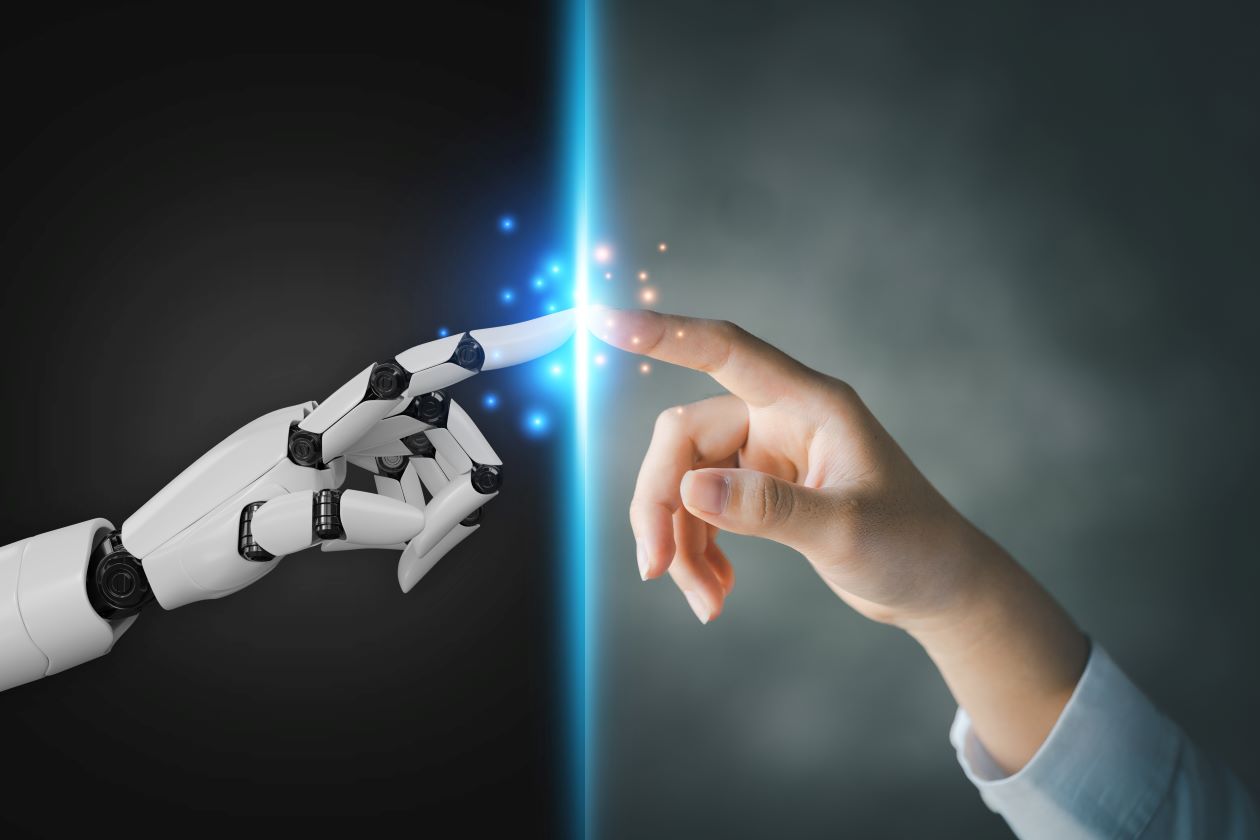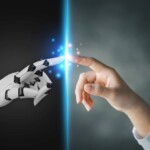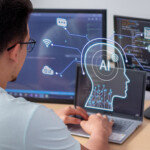The integration of Artificial Intelligence (AI) into human resources promises more efficiency and creative approaches. At the same time, we face challenges regarding data protection, personalization, and maintaining human interaction. In this article, we examine the potentials, challenges, and strategies for achieving a balanced AI-human equation in HR management.
Digital Transformation: Artificial Intelligence as the Key to HR Efficiency
According to a survey, 72% of HR executives are ready to integrate generative AI into their HR functions, and a quarter of them have already done so. Furthermore, 84% of respondents indicated that they believe AI would significantly increase their productivity.[1] This statement reinforces the common view that AI is a great support for a wide range of HR tasks.
For example, the recruitment landscape has changed significantly due to the advancement of Artificial Intelligence. With the help of AI tools, many tasks can be automated, including job postings, scheduling, and data management. There is also AI technology that can review a large number of resumes and match potential candidates with suitable positions. AI-driven tools can analyze large amounts of data precisely, thereby reducing the error rate in decision-making.[2] AI tools provide valuable insights through data analysis and support HR professionals in making informed, data-driven decisions in recruiting, talent management, or strategies for employee retention. Here, technology is seen as a support, while humans review, verify, and decide on the measures to be taken in recruiting.
Another advantage of using AI is in automating repetitive tasks. This gives HR professionals the opportunity to focus on strategic initiatives.[1] In times of skilled labor shortages, the Great Resignation, or Quiet Quitting, strategies for employee retention are crucial. Industry insiders say that AI-driven tools offer companies competitive advantages in terms of employee retention, motivation, and engagement in talent management, ultimately contributing to the company’s success.[1]
Special AI tools help HR professionals successfully create content for their career pages. These tools provide additional resources for recruiting teams to develop a content strategy and elaboration. The continuous development of AI technology makes it an even more powerful tool for strengthening the employer brand and opens up new ways to attract and retain suitable talents in the long term.[3]
Balancing Act in Recruiting: AI Challenges Between Personalization and Data Protection
While AI has many positives, potential security threats cannot be ignored. Companies are advised to primarily opt for reliable AI applications from trustworthy providers to protect sensitive HR data.[2] The downside is the potential misuse of this technology. For example, generative AI can create and publish Deep Fakes (realistic but fake images or videos). Furthermore, misinformation could be spread or individuals defamed – raising issues of data protection and security.[4] Since the introduction of the GDPR in 2018, data protection has become an essential aspect for all companies that work with sensitive, personal data. This is particularly true for recruiting, where a large amount of sensitive data from applicants and also employees is processed.
Besides recruiting new talent, for Talent Acquisition and HR professionals, measures to increase employee engagement and satisfaction are also on the agenda – including personalized HR approaches, focusing on individual needs and preferences. However, the right data protection measures must be implemented to ensure that personal data is protected and employees’ privacy is preserved. What can companies do to ensure the personalization of offers and measures while protecting privacy and data security? The use of anonymized data is one option. In addition, it is worth implementing technical solutions such as encrypted data transmissions and access restrictions to ensure the security of sensitive information. Transparent communication about data protection policies is also important.
Another danger in using AI in recruiting lies in the bias in algorithms. This means they can reinforce existing prejudices and discrimination, particularly affecting personnel selection negatively by relying on unequal or biased data. It is therefore crucial for companies to actively counteract biases by regularly reviewing their algorithms, diversifying data sources, and implementing transparent decision-making processes.
Artificial Intelligence in Service of Training: New Paths in HR Training
Given the rapid progress of Artificial Intelligence (both positively and negatively), it is essential to train employees and executives in the use of AI tools and systems. Through targeted training programs, digital competencies are strengthened, and a basic understanding of how AI algorithms work is created. This ensures that employees can successfully handle AI technologies and exploit their potential. Furthermore, continuous training is important so employees can keep up with the constantly evolving technologies in the HR sector. Companies are advised to invest in training programs to ensure seamless integration of AI into HR processes.[2]
Besides training the recruiting teams in handling AI tools in human resources, there is another aspect to training, as traditional training methods often need to meet the dynamic requirements of the modern workforce. Here, AI tools support the identification of skill gaps and the adjustment of learning paths. Thus, companies can ensure that their employees are equipped for the changing requirements of the industry.[2] In addition, it helps to alleviate employees’ fears that the use of AI tools might endanger their jobs. The advancement of Artificial Intelligence provides HR professionals with the opportunity to actively shape the future of work and create an environment where employees are productive, engaged, and satisfied.[1]
The Human Dimension in Human Resources: Empathy, Support, and Open Communication
To preserve the human dimension in HR management, it is important to continuously recognize human abilities such as empathy, emotional intelligence, and interpersonal relationships. HR professionals play a crucial role by supporting employees in personal and professional issues and creating a supportive work environment. One way to do this is to introduce feedback mechanisms and regular exchange opportunities to better understand and address employees’ needs and concerns. In this way, companies promote a culture of trust and openness and appreciate and strengthen their employees.
AI tools are excellent for repetitive, data-driven tasks and provide humans with space and time resources for creative problem-solving and complex decisions. Special AI tools can provide insights and data that support human decision-making and lead to better outcomes.[4]
An important factor to always consider: AI can only work within the limits of its programming. It cannot make creative decisions or think outside the box. This limits its ability to solve complex problems. Moreover, AI lacks emotional intelligence; it cannot understand the nuances of human behavior or communication. This can limit its effectiveness in customer service or other areas where human interaction is essential.[4]
Summary
The successful integration of AI in human resources requires a balanced understanding of opportunities and challenges, as well as a strong commitment to preserving the human component. By combining personalized approaches with data protection measures and supporting employees through training and further education, companies create a work environment that is both efficient and human. The successful integration of Artificial Intelligence and human interaction in HR management is crucial for the well-being of employees and the long-term success of a company. Companies ensure that their employees have the necessary skills to successfully meet the challenges of digital transformation in the HR sector with well-founded training and further education programs.
Learn more in our whitepaper on AI-supported content creation, on how AI can support your recruiting team in the resource-intensive creation of content for a coherent, understandable, and convincing content strategy, and what to look out for when using AI tools.
Sources
[1] Sharma, N. 06. Nov. 2023. The Future of HR: AI’s Impact on Employee Engagement. LinkedIn.
https://www.linkedin.com/pulse/future-hr-ais-impact-employee-engagement-niti-sharma-wfywc#:~:text=Benefits%20of%20AI%2DDriven%20Employee%20Engagement
[2] Anand, A. 02. Nov. 2023). The Transformative Power of Artificial Intelligence in Human Resources: Unlocking New Horizons. TheDailyGuardian. https://thedailyguardian.com/the-transformative-power-of-artificial-intelligence-in-human-resources-unlocking-new-horizons/
[3] Miyaki, R. (2023, Jul. 6). The Four Pillars of AI-Driven Talent Acquisition: Data, Technology, Creative and Knowledge. Radancy. https://blog.radancy.com/2023/07/06/the-four-pillars-of-ai-driven-talent-acquisition-data-technology-creative-and-knowledge/
[4] Saadat, S. 11. April 2023. AI vs. Humans: Who’s More Productive? LinkedIn.
https://www.linkedin.com/pulse/ai-vs-humans-whos-more-productive-sakib-saadat#:~:text=Comparing%20AI%20and%20Human%20Productivity%3A&






















